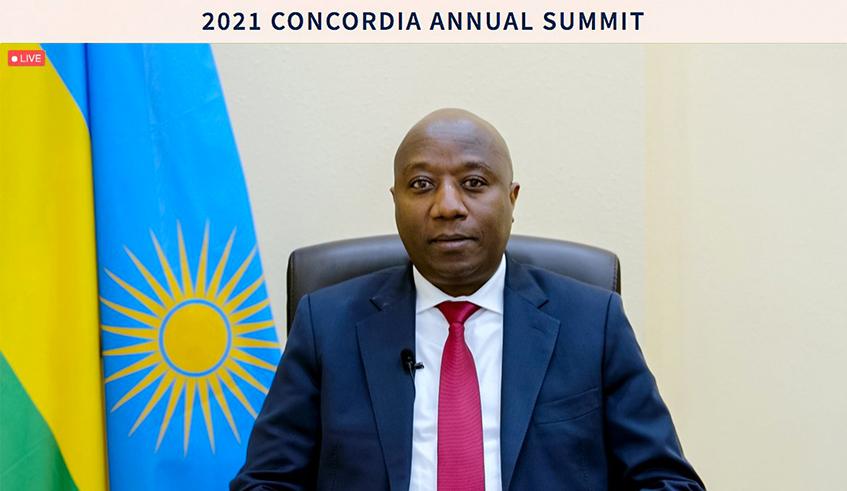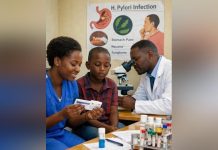Africa-Press – Rwanda. Prime Minister Edouard Ngirente has said that the challenges that Africa faces today require a new mindset, stressing that the Covid-19 pandemic has further exposed the need for Africa to be more self-reliant, mainly in strategic sectors. Such sectors, he said, include manufacturing and infrastructure.
Ngirente was virtually addressing this year’s Concordia Annual Summit, where he was joined by heads of government, entrepreneurs, innovators and other notable guests for conversations on social, political and economic topics to elevate the dialogue surrounding critical global issues.
In his remarks, the Premier shared lessons from Rwanda’s experience in her journey towards more self-reliance in infrastructure and manufacturing. “These key lessons revolve around three topics; leveraging private sector led- development with a conducive environment and reforms for long-term growth, promoting innovation and going digital, as well as supporting recovery through manufacturing and other targeted actions.”
In the context of Private-sector-led growth, he said, Rwanda’s business climate remains favourable to investments, offering stability and transparency. He added that reforms followed a holistic approach covering good governance, macroeconomic stability and business climate.
“In 2016, the Government of Rwanda enacted a Public-Private Partnerships law. This was part of a broad regulatory and institutional framework for Public-Private Partnerships to provide clarity, transparency and efficiency to investors.”
He pointed out that partnerships with the private sector are at the core of Rwanda’s trade readiness. For instance, Ngirente said, Rwanda is implementing the Electronic World Trade Platform (e-WTP) project.
He added that Rwanda also established, Kigali Logistics Platform, an inland cargo handling facility. “This facility launched in October 2019, is now operational and works are ongoing for its expansion.”
Scaling up IT infrastructure According to Ngirente, Rwanda is committed to scale up IT infrastructure, as the country continues to position itself as one of the most ICT-ready countries in Africa.
“Currently, Rwanda counts several miles (7,000km) of fibre optic cable network, over 98% 4G LTE coverage as well as mobile phone penetration that exceeds 84% of the population.,” he said.
Consequently, institutional openness to innovations has brought in new connectivity solutions such as Zipline, a company that users drones to deliver vital medical supplies to hospitals in the country.
Zipline was launched as a proof of concept in Rwanda, and has since expanded into other African countries. “We believe that the manufacturing sector will play a significant role in the economic development of African continent.”
Since 2018, manufacturing has started reemerging and last year, it accounted for 12% share of GDP, adding that the sector is even more critical in driving recovery post-Covid.
AfCFTA has huge potential There is also a great expectation with the implementation of the African Continental Free Trade Area (AfCFTA), the Premier said.
“It is expected to unlock manufacturing potential and facilitate industrialization, driving sustainable growth and creating jobs.”
Furthermore, he said, challenges of accessing sufficient vaccine supplies came as a wake-up call for Africa to scale up production of crucial medical products, such as vaccines. Ngirente reiterated that Rwanda is one of the African countries planning to set up a plant for vaccine manufacturing.
Other measures put in place include an Economic Recovery Fund which was established to support various businesses starting with the most hit by the pandemic so that they can survive, resume production and safeguard employment.
The fund also aims at expanding domestic production of essential products, beyond the pandemic. Meanwhile, the premier said that in a bid to speed up recovery and economic resilience, the Government of Rwanda started the Manufacture and Build to Recover Programme (MBRP) in December 2020.
He explained that this also came after realizing that more incentives were needed to lower production costs, and thereby stimulate investments in the economy.
“This programme offers taxes and import duty exemptions to investors. It is expected to increase investments in real estate and manufacturing and therefore provide thousands of new decent jobs to our citizens.”
The latter has so far delivered tangible results, he said. According to him, projections show that Rwanda’s economy is expected to grow by 5.1% in 2021.
“it is important to join forces to support private sector development, and improve our African economic growth.”






